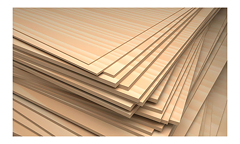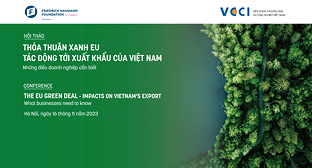What happens to exported plywood when the US conducts investigation on anti-tax evasion?
30/06/2020 12:00

Until now, anti-tax evasion measures have not greatly affected Vietnam's export turnover, especially for wood items. However, the Ministry of Industry and Trade noted that enterprises need to have a strategy to develop a source of domestic raw materials, coping with investigations on anti-tax evasion in the long-term.
As of June 2020, the Ministry of Industry and Trade has dealt with 176 cases of trade remedies applied by foreign countries to Vietnam's exported goods. In the first six months of this year, the Ministry of Industry and Trade was dealing with 13 cases of trade remedies investigated by foreign countries for Vietnamese goods and six cases that are likely to be investigated in the near future (greater than the number of cases in 2019).
Export products which were subjected to investigate are very diverse, of that seven cases of investigations relating to wood items, accounting for 4%. Although accounting for a small proportion of the total number of cases of trade remedies, the Ministry of Industry and Trade noted the level of investigation with wooden products is on the rise.
In 2007 - 2017, there were only three cases with wood item, but from 2018 until now, there have been four cases with this product.
On the other hand, the export turnover of cases relating to wood items recently have been much higher than those in 2007-2017. For example, the anti-dumping case of MDF wood investigated by India in 2015 had an export turnover of about $3.1 million, while plywood investigated by South Korea in 2019 had an export turnover of about $170 million.
Recently, on June 17, 2020, the United States Department of Commerce (DOC) initiated an investigation of anti-dumping and anti-tax evasion and anti-subsidy which is applied to Chinese plywood products imported from Vietnam. The export turnover of this product to the US of Vietnam in 2019 was about $300 million.
In case the DOC concluded Vietnam's plywood products evade trade remedies duty imposed on similar products of China, the US will issue a tax imposition order on this Vietnamese product from the time of initiating the investigation with highest tax rate being imposed on China (dumping tax is 183.36% and anti-subsidy duty is 22.98% - 194.9%).
Bui Chinh Nghia, Director of Department of Forestry Production Development (General Department of Forestry, Ministry of Agriculture and Rural Development) said the suit in the commercial competition is normal when Vietnam increasingly penetrated deeply into the international economy and has large trade.
This was an opportunity for businesses to look back on themselves and genuine businesses have good conditions to reaffirm themselves.
Does not affect exports much
From the perspective of the US initiating a lawsuit of anti-tax evasion, how it affects exports of plywood, Nghia stressed that: “In 2019, this product was exported mainly to the US and China markets. In the first half of this year, export value was still similar to the same period last year. This move will certainly affect export value but it had a certain delay.”
The Vietnam Administration of Forestry (VNFOREST) is cooperating with Vietnam Timber and Forest Products Association (Vinforest) and localities to guide businesses in pursuing the lawsuit and report to MARD leaders, in coordination with the Ministry of Industry and Trade to overcome US lawsuits.
The Ministry of Industry and Trade stated that in the cases of anti-tax evasion investigations so far, anti-tax evasion measures had not significantly affected Vietnam's export turnover because enterprises have used raw materials from domestic sources or other countries instead of Chinese raw materials to produce export goods.
Timber materials harvested in Vietnam annually were enough to produce 8.4 million m3 of plywood while the total volume of exported plywood of Vietnam in 2019 was 2.5 million m3. Therefore, in terms of input materials, Vietnam could supply to plywood factories.
To effectively respond to trade remedies cases with the current timber industry and the case of plywood, the Ministry of Industry and Trade recommended Vietnamese enterprises that export plywood study mechanisms, regulations and investigative procedures of the US.
Over the past time, the US has frequently changed its regulations and procedures to make it easier to initiate and apply. In many cases, investigation agencies (such as US Customs and Border Protection) can take the initiative to investigate without publicity.
Besides that, regulations on "significant transformation" or requirements for "cooperation" and "provision of information" may change from case to case, so enterprises must find out in order to catch up and satisfy relevant conditions.
In addition, the Ministry of Industry and Trade said enterprises also needed to develop strategies to diversify products and diversify export markets and have a strategy for developing sources of domestic raw material, noting this was also a long-term solution to cope with growing anti-tax evasion investigations.
As of June 2020, the Ministry of Industry and Trade has dealt with 176 cases of trade remedies applied by foreign countries to Vietnam's exported goods. In the first six months of this year, the Ministry of Industry and Trade was dealing with 13 cases of trade remedies investigated by foreign countries for Vietnamese goods and six cases that are likely to be investigated in the near future (greater than the number of cases in 2019).
Export products which were subjected to investigate are very diverse, of that seven cases of investigations relating to wood items, accounting for 4%. Although accounting for a small proportion of the total number of cases of trade remedies, the Ministry of Industry and Trade noted the level of investigation with wooden products is on the rise.
In 2007 - 2017, there were only three cases with wood item, but from 2018 until now, there have been four cases with this product.
On the other hand, the export turnover of cases relating to wood items recently have been much higher than those in 2007-2017. For example, the anti-dumping case of MDF wood investigated by India in 2015 had an export turnover of about $3.1 million, while plywood investigated by South Korea in 2019 had an export turnover of about $170 million.
Recently, on June 17, 2020, the United States Department of Commerce (DOC) initiated an investigation of anti-dumping and anti-tax evasion and anti-subsidy which is applied to Chinese plywood products imported from Vietnam. The export turnover of this product to the US of Vietnam in 2019 was about $300 million.
In case the DOC concluded Vietnam's plywood products evade trade remedies duty imposed on similar products of China, the US will issue a tax imposition order on this Vietnamese product from the time of initiating the investigation with highest tax rate being imposed on China (dumping tax is 183.36% and anti-subsidy duty is 22.98% - 194.9%).
Bui Chinh Nghia, Director of Department of Forestry Production Development (General Department of Forestry, Ministry of Agriculture and Rural Development) said the suit in the commercial competition is normal when Vietnam increasingly penetrated deeply into the international economy and has large trade.
This was an opportunity for businesses to look back on themselves and genuine businesses have good conditions to reaffirm themselves.
Does not affect exports much
From the perspective of the US initiating a lawsuit of anti-tax evasion, how it affects exports of plywood, Nghia stressed that: “In 2019, this product was exported mainly to the US and China markets. In the first half of this year, export value was still similar to the same period last year. This move will certainly affect export value but it had a certain delay.”
The Vietnam Administration of Forestry (VNFOREST) is cooperating with Vietnam Timber and Forest Products Association (Vinforest) and localities to guide businesses in pursuing the lawsuit and report to MARD leaders, in coordination with the Ministry of Industry and Trade to overcome US lawsuits.
The Ministry of Industry and Trade stated that in the cases of anti-tax evasion investigations so far, anti-tax evasion measures had not significantly affected Vietnam's export turnover because enterprises have used raw materials from domestic sources or other countries instead of Chinese raw materials to produce export goods.
Timber materials harvested in Vietnam annually were enough to produce 8.4 million m3 of plywood while the total volume of exported plywood of Vietnam in 2019 was 2.5 million m3. Therefore, in terms of input materials, Vietnam could supply to plywood factories.
To effectively respond to trade remedies cases with the current timber industry and the case of plywood, the Ministry of Industry and Trade recommended Vietnamese enterprises that export plywood study mechanisms, regulations and investigative procedures of the US.
Over the past time, the US has frequently changed its regulations and procedures to make it easier to initiate and apply. In many cases, investigation agencies (such as US Customs and Border Protection) can take the initiative to investigate without publicity.
Besides that, regulations on "significant transformation" or requirements for "cooperation" and "provision of information" may change from case to case, so enterprises must find out in order to catch up and satisfy relevant conditions.
In addition, the Ministry of Industry and Trade said enterprises also needed to develop strategies to diversify products and diversify export markets and have a strategy for developing sources of domestic raw material, noting this was also a long-term solution to cope with growing anti-tax evasion investigations.
Source: VN Explorer
Các tin khác
- Exports face challenges despite enjoying robust growth (26/04/2024)
- Vietnam ranks fifth among aquatic product suppliers for Singapore (26/04/2024)
- Some firms likely to close due to higher anti-dumping tariff on plywood products in S Korea (26/04/2024)
- Foreign businesses increasingly seek export sources in Vietnam (26/04/2024)
- Japan's investigation into China's graphite electrodes to 'affect regional cooperation' (26/04/2024)
 Home
Home
 About Us
About Us




















